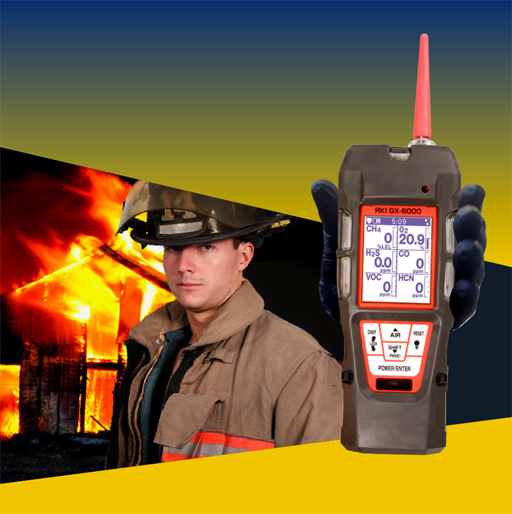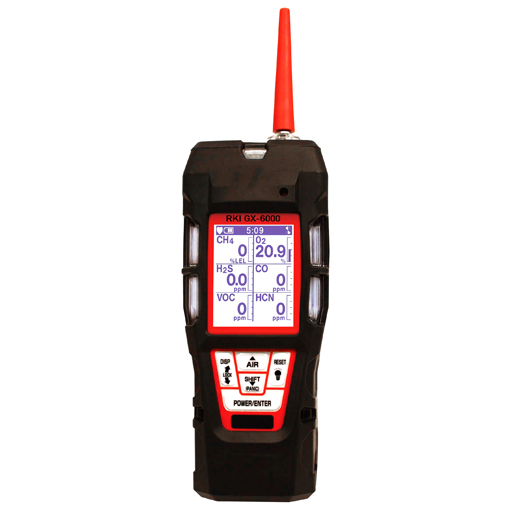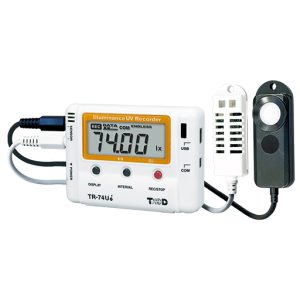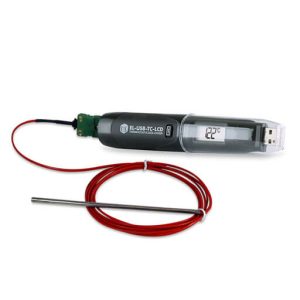Available for rent!
Simply put, the GX-6000 natural gas detector is a game-changer. This powerful hand-held instrument is capable of simultaneously monitoring up to 6 gases.
In addition to the standard 4 confined space gases which include combustibles, O2, CO, & H2S, the GX-6000 natural gas detector has 2 additional smart channels that accept PID, IR or super toxic sensors.
Equipped with a strong internal sample pump, a man-down alarm, a panic alarm, an LED flashlight, and large auto rotating LCD display, the GX-6000 can operate as a single gas PID unit or a multifunctional tool utilizing all 6 channels. The GX-6000 with a PID sensor will come equipped with a library of over 600 VOC gases to choose from as standard. Choosing from the library is easy with a personalized favorites list of 30 commonly used VOC’s as well as a list of 8 of the most recently used VOC’s. A benzene-specific version is available using a pre-filter tube for detecting low levels of benzene.
The GX-6000 Natural gas detector has a rugged design built for the nastiest environments. It is equipped with a removable impact-resistant rubber boot and a dust and water-resistant enclosure with an IP-67 rating. With 5 bright LED lights on 3 sides of the instrument, alarms are easily seen from a variety of perspectives. With vibration and loud audible alarm, GX-6000 will easily alert users when needed.
Training video – natural gas detector
What is the best gas detector? – one that meets the necessary quality criteria for YOUR project
- Monitor up to 6 gases
- 2 smart sensor slots auto recognize PID, IR, and super toxic sensors
- 6 Operating modes: normal, leak check, benzene select mode, inert, snap log, and bar hole
- Library of over 600 VOCs
- PPM Leak Check mode
- Man-down and panic alarms
- Auto display rotation
- LED Light source
- Internal sample pump
- Glove-friendly glow in the dark buttons
- Lightweight, small, rugged IP-67 design
- Interchangeable battery packs Li-ion / alkaline
- Operates up to 14 hours on Li-ion battery pack, fully recharges in 3 hours
- Field replaceable sensors, batteries, and filters
RKI – GX-6000 applications
- Confined space entry
- Hazmat response teams
- Arson investigation
- Remediation sites
- Perimeter monitoring
- Leak detection
- Landfill monitoring
- Wing tank entry
One of the best natural gas detectors, now available in Canada
|
Gases & Detectable Ranges |
|||||
| Gas | Measuring Range | Reading Increment | Alarm Set Points | Accuracy (which ever is greater) | |
| PID Sensors | |||||
| 10.6 Lamp | 600 VOC’s | 0 – 50,000 ppb | 1 ppb: (< 5000 ppb) 10 ppb: (> 5,000 ppb) | A1: 5,000 ppb | ± 10% of reading, ± 1 digit |
| A2: 10,000 ppb | |||||
| 0 – 6,000 ppm | 0.1 ppm: (< 600 ppm) 1 ppm: (> 600 ppm) | A1: 400 ppm | |||
| A2: 1,000 ppm | |||||
| 10.0 Lamp | Benzene Specific | 0.1 – 50 ppm | 0.01 ppm (0 ~ 10 ppm) 0.1 ppm (10 ~ 50 ppm) | No Alarms | |
| 300 VOC’s | 0 – 100 ppm | 0.01 ppm (0 ~ 10 ppm) 0.1 ppm (10 ~ 100 ppm) | A1: 5 ppm A2: 10 ppm | ||
| 11.7 Lamp | High Voltage Lamp | 0 – 1000 ppm | 0.1 ppm | A1: 400 ppm | |
| A2: 1,000 ppm | |||||
| Galvanic | |||||
| Oxygen (O2) | 0 – 40.0% Vol. | 0.1% Vol. | A1: 19.5 Vol. | ± 0.5% O2 | |
| A2: 23.5 Vol. | |||||
| Electro-Chemical | |||||
| Carbon Monoxide (CO) | 0 – 500 ppm | 1 ppm | A1: 25 ppm | ± 5% of reading or ± 5 ppm | |
| A2: 50 ppm | |||||
| TWA 25 ppm | |||||
| STEL 200 ppm | |||||
| Hydrogen Sulfide (H2S) | 0 – 100.0 ppm | 0.5 ppm | A1: 5.0 ppm | ± 5% of reading or ± 2 ppm | |
| A2: 30.0 ppm | |||||
| TWA 1.0 ppm | |||||
| STEL 5.0 ppm | |||||
| Toxics (EC Sensors) | |||||
| Ammonia (NH3) | 0 – 400.0 ppm | 0.5 ppm | A1: 25 ppm | ± 10% of reading or ± 5% of full scale | |
| A2: 50 ppm | |||||
| Chlorine (Cl2) | 0 – 10.00 ppm | 0.05 ppm | A1: 0.5 ppm | ||
| A2: 1.0 ppm | |||||
| Hydrogen Cyanide (HCN) | 0 – 15.0 ppm | 0.1 ppm | A1: 5 ppm | ||
| A2: 10 ppm | |||||
| Nitrogen Dioxide (NO2) | 0 – 20.00 ppm | 0.05 ppm | A1: 3 ppm | ||
| A2: 6 ppm | |||||
| Sulfur Dioxide (SO2) | 0 – 99.90 ppm | A1: 2 ppm | |||
| A2: 5 ppm | |||||
| IR Sensors | |||||
| Carbon Dioxide (CO2) | 0 – 10,000 ppm | 20 ppm | A1: 5,000 ppm | ± 5% of reading or ± 2% of full scale | |
| TWA 5,000 ppm | |||||
| 0 – 10.00% Vol. | 0.02% | A1: 0.50% Vol | |||
| A2: 3.00% Vol | |||||
| STEL 3.00% Vol | |||||
| TWA 0.50% Vol | |||||
| Methane (CH4) | 0 – 100% LEL 0 – 100% Vol. | 1% LEL/ 0.5% Vol | A1: 10% LEL A2: 50% LEL | ||
| Hydrocarbons | 0 – 100% LEL 0 – 30% Vol. | ||||
| Catalytic | |||||
| Hydrocarbons (CH4, std) | 0 – 100% LEL | 1% LEL | A1: 10%LEL | ± 5% of reading or ± 2% LEL | |
| A2: 50%LEL | |||||
|
Common Specifications |
|||
| Alarm Types | Gas alarm | Man-down | Trouble |
| Low and high adjustable | 1st – self reset 2nd – latching | Low flow Sensor connection Low battery Circuit error Calibration range | |
| Sample Method | Sample draw pump, flow rate 0.45 LPM, 50-foot sample range | ||
| Display | Digital LCD, auto backlight, peak bar display, auto display rotation, and customize the order of gases | ||
| Audible Alarm | 95 dB at 1 ft. | ||
| Languages | English, Spanish, French, German, Italian, Japanese, Korean, Portuguese, Russian | ||
| Continuous Operation | 14 hours on Lithium-ion battery pack. Complete recharge in 3 hours. 8 hours Alkaline battery pack (3 AA-size within each pack) | ||
| Operating Temp. & Humidity | -4°F to 122°F (-20°C ~ +50℃), 0- 95% RH non condensing | ||
| Dimensions | 2.6” W x 7.8” H x 2” D (H200 x W68 x D52 mm) 14 ounce (400g) (with lithium battery pack) | ||
| Case Material | Dust and water-resistant with IP-67 approval (exclude sample hose and probe) | ||
| Safety Design / Approvals | Explosion-proof: IECEx, ATEX, TIIS, cCSAus Explosion class: Ex ia IIC T4 Ga Others: CE Marking | ||
| Standard Features | 2 Smart sensors slots auto recognize sensor changes Library of over 600 VOC’s User-defined VOC list. Up to 30 frequently used Recent VOC list for last 8 selected gases Pump and circuit status indicators User & station ID selection menu Datalogging (interval, alarm trend, station, and user ID) Snap logging – on-demand data logging Demand zero / Auto zero BUMP and CAL expiration alarm Flashlight IrDA communication LEL sensor protection mode | ||
| Standard Accessories | • Rubber boot • Belt clip • Hand strap • Tapper nozzle• Probe with hydrophobic & dust filter 3’ Teflon lined hose • Benzene pre-filter tubes and holder (benzene versions) | ||
| Optional Accessories | • SDM-6000 calibration station • Bundles with instrument carrying case and accessories • Flexible probes • Up to 50-foot sample hoses • Filter set • IrDA cable | ||
| Warranty | Two years of material (including sensors) and workmanship. One year for PID sensor (Two months for 11.7 eV lamp) | ||
QUICK TIP:
Responding to Alarms
This section describes the response to gas, over the range, battery, sensor failure, clock failure,
system failure, man down, and panic alarms.
Responding to Gas Alarms
1 . Determine which gas alarm has been activated.
2 . Follow your established procedure for an increasing gas condition or a decreasing
oxygen condition.
3 . Reset or silence the alarm as necessary or allowed. Table 7 below summarizes
resetting and silencing alarms for all ALARM LATCHING and ALARM
SILENCE combinations that are possible. See pg.151 and pg.151 of the manual for further
descriptions of these parameters.
Available for rent!
Simply put, the GX-6000 natural gas detector is a game-changer. This powerful hand-held instrument is capable of simultaneously monitoring up to 6 gases.
In addition to the standard 4 confined space gases which include combustibles, O2, CO, & H2S, the GX-6000 natural gas detector has 2 additional smart channels that accept PID, IR or super toxic sensors.
Equipped with a strong internal sample pump, a man-down alarm, a panic alarm, an LED flashlight, and large auto rotating LCD display, the GX-6000 can operate as a single gas PID unit or a multifunctional tool utilizing all 6 channels. The GX-6000 with a PID sensor will come equipped with a library of over 600 VOC gases to choose from as standard. Choosing from the library is easy with a personalized favorites list of 30 commonly used VOC’s as well as a list of 8 of the most recently used VOC’s. A benzene-specific version is available using a pre-filter tube for detecting low levels of benzene.
The GX-6000 Natural gas detector has a rugged design built for the nastiest environments. It is equipped with a removable impact-resistant rubber boot and a dust and water-resistant enclosure with an IP-67 rating. With 5 bright LED lights on 3 sides of the instrument, alarms are easily seen from a variety of perspectives. With vibration and loud audible alarm, GX-6000 will easily alert users when needed.
Training video – natural gas detector
What is the best gas detector? – one that meets the necessary quality criteria for YOUR project
- Monitor up to 6 gases
- 2 smart sensor slots auto recognize PID, IR, and super toxic sensors
- 6 Operating modes: normal, leak check, benzene select mode, inert, snap log, and bar hole
- Library of over 600 VOCs
- PPM Leak Check mode
- Man-down and panic alarms
- Auto display rotation
- LED Light source
- Internal sample pump
- Glove-friendly glow in the dark buttons
- Lightweight, small, rugged IP-67 design
- Interchangeable battery packs Li-ion / alkaline
- Operates up to 14 hours on Li-ion battery pack, fully recharges in 3 hours
- Field replaceable sensors, batteries, and filters
RKI – GX-6000 applications
- Confined space entry
- Hazmat response teams
- Arson investigation
- Remediation sites
- Perimeter monitoring
- Leak detection
- Landfill monitoring
- Wing tank entry
One of the best natural gas detectors, now available in Canada
|
Gases & Detectable Ranges |
|||||
| Gas | Measuring Range | Reading Increment | Alarm Set Points | Accuracy (which ever is greater) | |
| PID Sensors | |||||
| 10.6 Lamp | 600 VOC’s | 0 – 50,000 ppb | 1 ppb: (< 5000 ppb) 10 ppb: (> 5,000 ppb) | A1: 5,000 ppb | ± 10% of reading, ± 1 digit |
| A2: 10,000 ppb | |||||
| 0 – 6,000 ppm | 0.1 ppm: (< 600 ppm) 1 ppm: (> 600 ppm) | A1: 400 ppm | |||
| A2: 1,000 ppm | |||||
| 10.0 Lamp | Benzene Specific | 0.1 – 50 ppm | 0.01 ppm (0 ~ 10 ppm) 0.1 ppm (10 ~ 50 ppm) | No Alarms | |
| 300 VOC’s | 0 – 100 ppm | 0.01 ppm (0 ~ 10 ppm) 0.1 ppm (10 ~ 100 ppm) | A1: 5 ppm A2: 10 ppm | ||
| 11.7 Lamp | High Voltage Lamp | 0 – 1000 ppm | 0.1 ppm | A1: 400 ppm | |
| A2: 1,000 ppm | |||||
| Galvanic | |||||
| Oxygen (O2) | 0 – 40.0% Vol. | 0.1% Vol. | A1: 19.5 Vol. | ± 0.5% O2 | |
| A2: 23.5 Vol. | |||||
| Electro-Chemical | |||||
| Carbon Monoxide (CO) | 0 – 500 ppm | 1 ppm | A1: 25 ppm | ± 5% of reading or ± 5 ppm | |
| A2: 50 ppm | |||||
| TWA 25 ppm | |||||
| STEL 200 ppm | |||||
| Hydrogen Sulfide (H2S) | 0 – 100.0 ppm | 0.5 ppm | A1: 5.0 ppm | ± 5% of reading or ± 2 ppm | |
| A2: 30.0 ppm | |||||
| TWA 1.0 ppm | |||||
| STEL 5.0 ppm | |||||
| Toxics (EC Sensors) | |||||
| Ammonia (NH3) | 0 – 400.0 ppm | 0.5 ppm | A1: 25 ppm | ± 10% of reading or ± 5% of full scale | |
| A2: 50 ppm | |||||
| Chlorine (Cl2) | 0 – 10.00 ppm | 0.05 ppm | A1: 0.5 ppm | ||
| A2: 1.0 ppm | |||||
| Hydrogen Cyanide (HCN) | 0 – 15.0 ppm | 0.1 ppm | A1: 5 ppm | ||
| A2: 10 ppm | |||||
| Nitrogen Dioxide (NO2) | 0 – 20.00 ppm | 0.05 ppm | A1: 3 ppm | ||
| A2: 6 ppm | |||||
| Sulfur Dioxide (SO2) | 0 – 99.90 ppm | A1: 2 ppm | |||
| A2: 5 ppm | |||||
| IR Sensors | |||||
| Carbon Dioxide (CO2) | 0 – 10,000 ppm | 20 ppm | A1: 5,000 ppm | ± 5% of reading or ± 2% of full scale | |
| TWA 5,000 ppm | |||||
| 0 – 10.00% Vol. | 0.02% | A1: 0.50% Vol | |||
| A2: 3.00% Vol | |||||
| STEL 3.00% Vol | |||||
| TWA 0.50% Vol | |||||
| Methane (CH4) | 0 – 100% LEL 0 – 100% Vol. | 1% LEL/ 0.5% Vol | A1: 10% LEL A2: 50% LEL | ||
| Hydrocarbons | 0 – 100% LEL 0 – 30% Vol. | ||||
| Catalytic | |||||
| Hydrocarbons (CH4, std) | 0 – 100% LEL | 1% LEL | A1: 10%LEL | ± 5% of reading or ± 2% LEL | |
| A2: 50%LEL | |||||
|
Common Specifications |
|||
| Alarm Types | Gas alarm | Man-down | Trouble |
| Low and high adjustable | 1st – self reset 2nd – latching | Low flow Sensor connection Low battery Circuit error Calibration range | |
| Sample Method | Sample draw pump, flow rate 0.45 LPM, 50-foot sample range | ||
| Display | Digital LCD, auto backlight, peak bar display, auto display rotation, and customize the order of gases | ||
| Audible Alarm | 95 dB at 1 ft. | ||
| Languages | English, Spanish, French, German, Italian, Japanese, Korean, Portuguese, Russian | ||
| Continuous Operation | 14 hours on Lithium-ion battery pack. Complete recharge in 3 hours. 8 hours Alkaline battery pack (3 AA-size within each pack) | ||
| Operating Temp. & Humidity | -4°F to 122°F (-20°C ~ +50℃), 0- 95% RH non condensing | ||
| Dimensions | 2.6” W x 7.8” H x 2” D (H200 x W68 x D52 mm) 14 ounce (400g) (with lithium battery pack) | ||
| Case Material | Dust and water-resistant with IP-67 approval (exclude sample hose and probe) | ||
| Safety Design / Approvals | Explosion-proof: IECEx, ATEX, TIIS, cCSAus Explosion class: Ex ia IIC T4 Ga Others: CE Marking | ||
| Standard Features | 2 Smart sensors slots auto recognize sensor changes Library of over 600 VOC’s User-defined VOC list. Up to 30 frequently used Recent VOC list for last 8 selected gases Pump and circuit status indicators User & station ID selection menu Datalogging (interval, alarm trend, station, and user ID) Snap logging – on-demand data logging Demand zero / Auto zero BUMP and CAL expiration alarm Flashlight IrDA communication LEL sensor protection mode | ||
| Standard Accessories | • Rubber boot • Belt clip • Hand strap • Tapper nozzle• Probe with hydrophobic & dust filter 3’ Teflon lined hose • Benzene pre-filter tubes and holder (benzene versions) | ||
| Optional Accessories | • SDM-6000 calibration station • Bundles with instrument carrying case and accessories • Flexible probes • Up to 50-foot sample hoses • Filter set • IrDA cable | ||
| Warranty | Two years of material (including sensors) and workmanship. One year for PID sensor (Two months for 11.7 eV lamp) | ||
QUICK TIP:
Responding to Alarms
This section describes the response to gas, over the range, battery, sensor failure, clock failure,
system failure, man down, and panic alarms.
Responding to Gas Alarms
1 . Determine which gas alarm has been activated.
2 . Follow your established procedure for an increasing gas condition or a decreasing
oxygen condition.
3 . Reset or silence the alarm as necessary or allowed. Table 7 below summarizes
resetting and silencing alarms for all ALARM LATCHING and ALARM
SILENCE combinations that are possible. See pg.151 and pg.151 of the manual for further
descriptions of these parameters.













